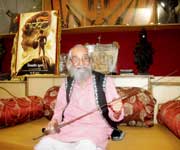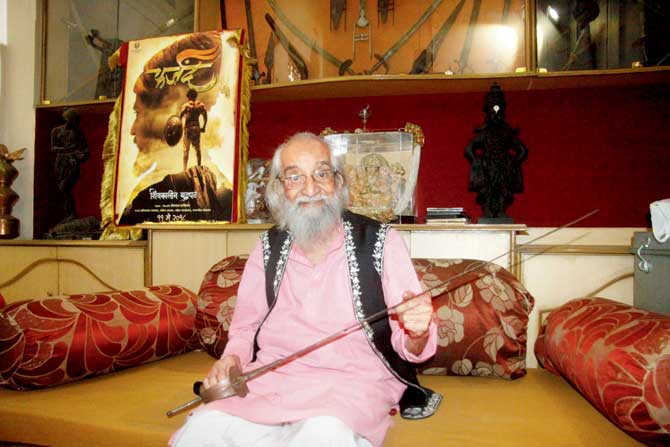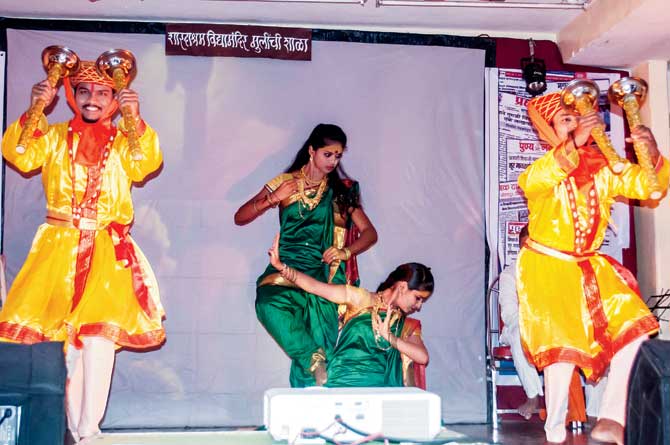At 95, historian and expert on Shivaji, Babasaheb Purandare will take stage in Mumbai to narrate stories of the Maratha king’s unsung collaborators through a musical

In 2011, when Anil Nalawade, playwright and co-founder of NGO Saisha Foundation Mumbai, approached historian Babasaheb Purandare with the draft of songs he had penned on Chhatrapati Shivaji, the latter was impressed. After pouring over the lyrics, Purandhare made a few suggestions. He felt there were some important people that Nalawade could include. For instance, there was Bahirji Naik, one of Shivaji's closest aides. "In the words of Chanakya, spies are the eyes and ears of the kingdom, and that's exactly what Naik, head of Shivaji's intelligence department, was to the Marathas. The speed and accuracy of his inputs at a time when there was no form of electronic communication, is the stuff of legend," he tells us over the phone from Pune, where he lives in his ancestral wada.
ADVERTISEMENT
 Babasaheb Purandare
Babasaheb Purandare
After a moment's pause, he adds, "How many of us know of him? Like Naik, there are other heroes from the period, all faceless, with little or no documentation to highlight their contribution. But they are relevant." Purandare's book Raja Shiv Chhatrapati and his famed long-running play, Janata Raja, are considered masterpieces on the life and times of the 16th century Maratha king.
At 95, Purandare makes fewer public appearances than he did, but he will make an exception on November 26 when he narrates Shivrudrache Digvijayi Tandav, a musical written by Nalawade that tells of Shivaji and his brave collaborators. The three-hour musical that was earlier performed at IIM Ahmedabad as a managements lesson, comprises songs, ballads, dance and weaponry inspired from medieval history. In Mumbai, it will be staged at the Royal Opera House, Charni Road.
"I remember when Anil had first approached me, I told him that I wanted to see the songs being performed on stage. And now, when I have been asked to play narrator, it's as if life has come full circle," he says.

The play will be staged at the Royal Opera House on November 26
The musical will also focus on Pratap Rao Gujar, commander in chief of Shivaji's army. "Gujar was efficient, and his valour was known to the Mughlas. However, he was extremely emotional. During a battle near Nesari village, Kolhapur, Adilshahi general Behlol Khan attacked the place with 40,000 men. When Shivaji was intimated, his command to Gujar was to either kill Khan or capture him alive.
Although Gujar managed to fight off Khan, he let him go because the latter pleaded for forgiveness and swore to never return," he says. When this news reached Shivaji, he was livid. According to Purandare, it was because the Maratha king knew he couldn't take Behlol Khan's pleas seriously. In a fit of rage, Shivaji wrote a long letter to Gujar, who he said had failed as commander. "He told him, don't show me your face unless Khan is caught," Purandare narrates.
After 15 days, Khan returned. This time with a mightier army. "Gujar was so hurt and angered that he decided to take on Behlol himself. He charged at his army with just seven men. In that frenzy, he killed many, but he was martyred too. He did it for the love of the country," says Purandare.
The musical's narrative also weaves in stories of a barber named Shiva Kashid, a look-alike of Shivaji, who risked his life and fooled the enemy during the warrior's escape from Panhalgad. "Kashid was like us, steeped in domesticity, but he harboured a desire to do something for the country. People used to mock him for his attempt to look like Shivaji, but he took pride in the resemblance. It eventually came in handy."
Purandare spends his days ploughing through historical manuscripts. Despite dedicating his life to the study of Shivaji, he feels there is more to explore. "Everything has to be studied because after Maharaj, there has not been a legend who can match his vision and character. We don't take history seriously. Those who do not understand their country's geography and ignore its history, will only head towards decline. We have seen it in the past. We do not wish to experience it again."
 Subscribe today by clicking the link and stay updated with the latest news!" Click here!
Subscribe today by clicking the link and stay updated with the latest news!" Click here!







